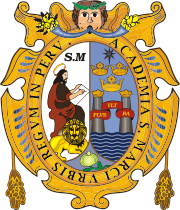University of San Marcos
| Universidad Nacional Mayor de San Marcos | |
 |
|
| Latin: Academia S. Marci Vrbis Regvm in Perv | |
| Motto | Universidad del Perú, Decana de América |
|---|---|
|
Motto in English
|
University of Peru, Dean of America |
| Type | Public |
| Established | May 12, 1551 |
| Rector | Dr. Orestes Cachay Boza |
|
Academic staff
|
2005 (full time) 674 (part time) |
| Undergraduates | 17,596 |
| Postgraduates | 2,198 |
| Location |
Lima, Peru 12°03′30″S 77°05′00″W / 12.05833°S 77.08333°WCoordinates: 12°03′30″S 77°05′00″W / 12.05833°S 77.08333°W |
| Campus |
Urban 70 hectares (170 acres) (Main campus) |
| Colors |
Gold Magenta White Steel blue |
| Mascot | Lion |
| Website | www.unmsm.edu.pe |
 |
|
The National University of San Marcos (Spanish: Universidad Nacional Mayor de San Marcos, UNMSM) is the most important and respected higher-education institution in Peru. It consistently ranks among the top two universities in the country. Its main campus, the University City, is located in Lima. It was chartered on May 12, 1551, by a royal decree signed by Charles V, Holy Roman Emperor, which makes it the oldest officially established university in the Americas and, as such, one of the oldest universities in the world. San Marcos has 60 academic-professional schools, organized into 20 faculties, and 6 academic areas. All the faculties offer undergraduate and graduate degrees. The student body consists of over 30,000 undergraduate and 4,000 graduate students from all the country, as well as some international students. The university has a number of public institutions under its government such as the San Marcos Cultural Center and the Museum of Natural History of Lima.
San Marcos' prestige in Latin America mainly arises from its renowned faculty and alumni. It is the only university in Peru with a Nobel Prize laureate among its alumni: Mario Vargas Llosa (Literature). San Marcos is also recognized for the quality of its curricular contents, its very competitive admission process, as well as for being a leading center of scientific research. Several Peruvian and Latin American influential thinkers, researchers, scientists, politicians and writers have studied there, which underscores San Marcos' leading role as an educational institution in the history of Peru and the world.
...
Wikipedia
